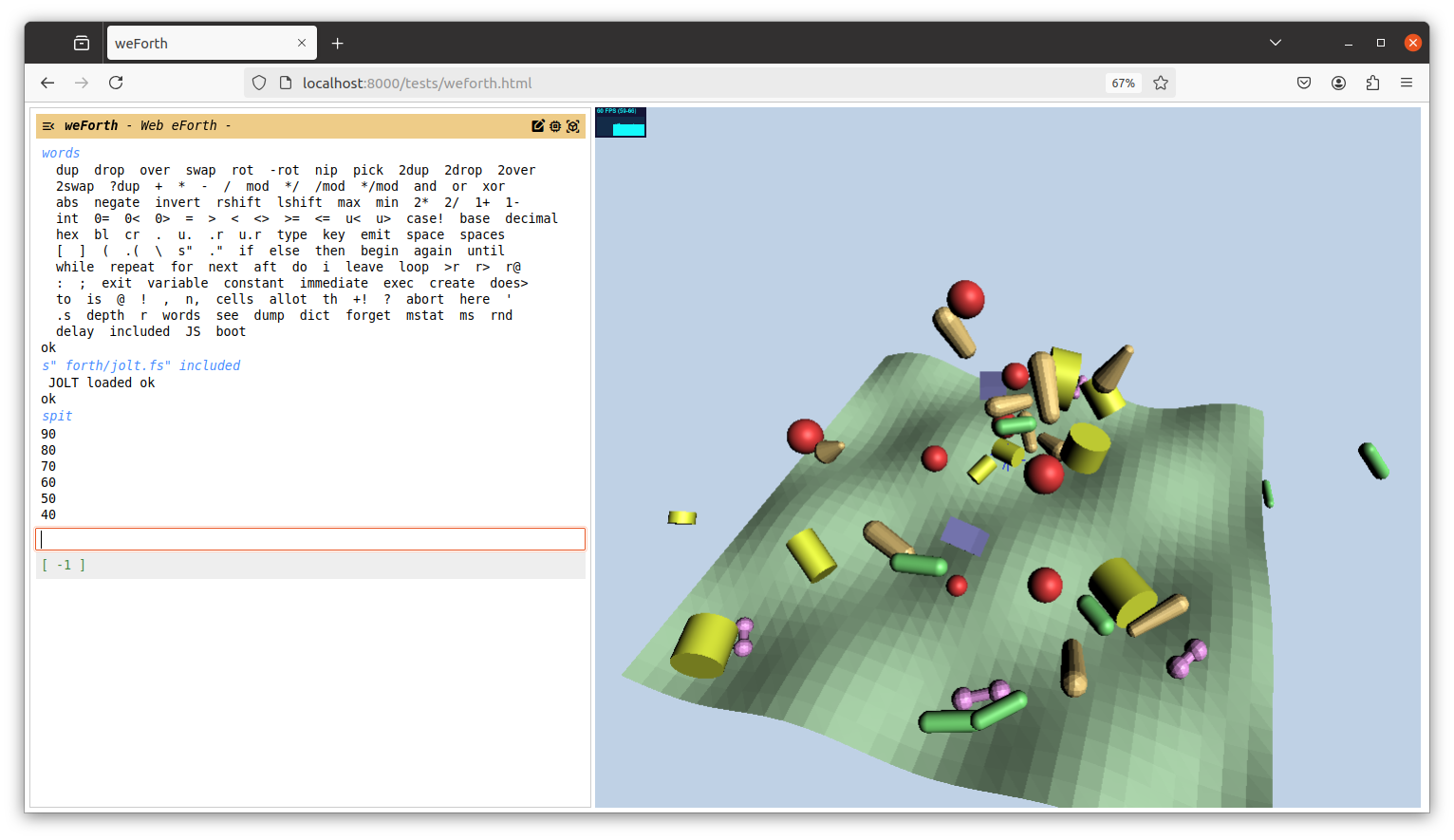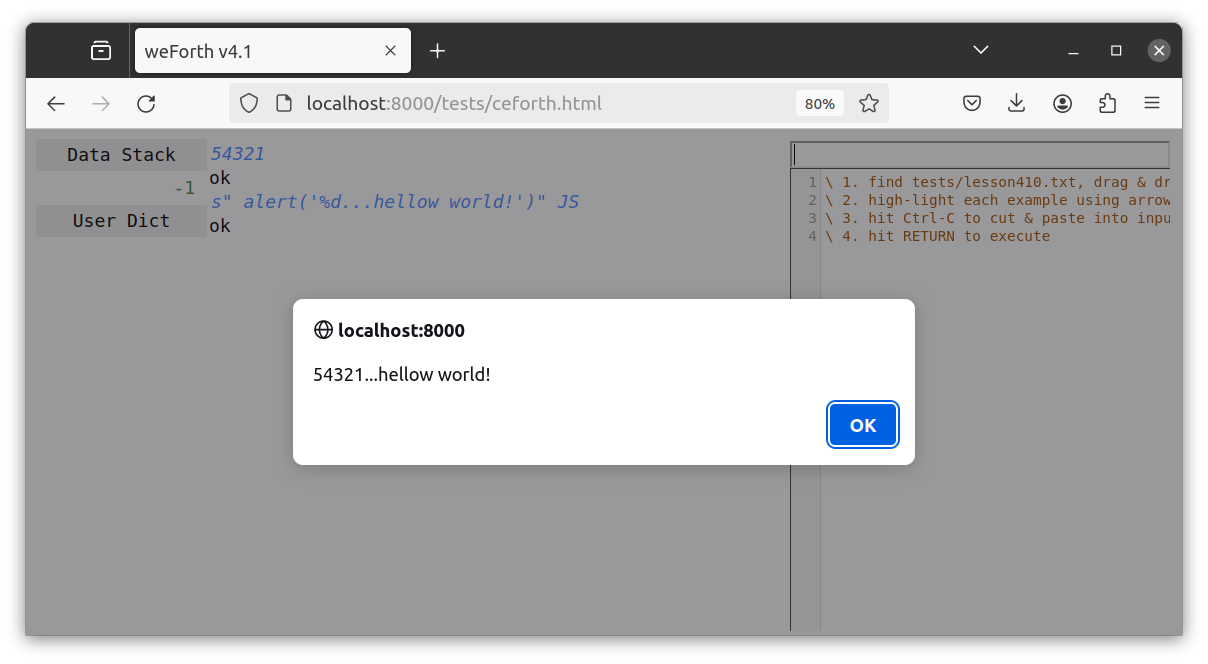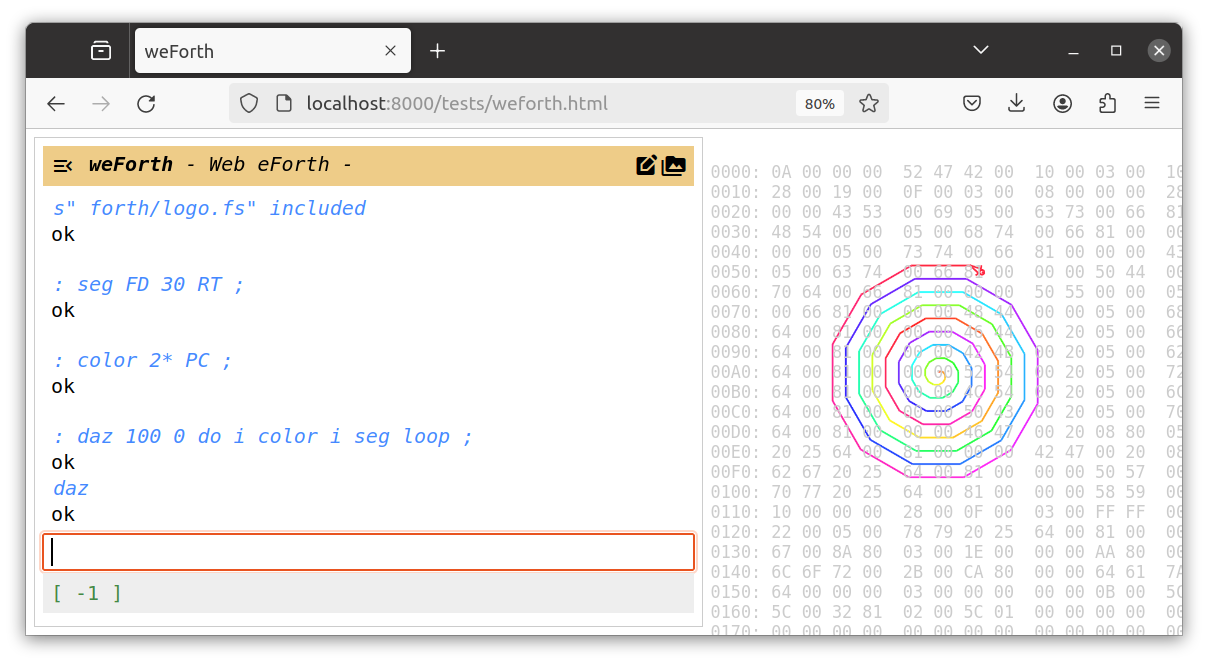WebAssembly enpowered eForth on web browsers. Is it faster? Is it more portable? Yes, and Yes.
Well, on my aged laptop, the impression is pretty exciting! It's at least 5x faster than pure Javascript implementation on a browser and at 40% speed of C/C++ natively compiled code on CPU. It was at 25% of native a year ago but as Javascript JIT improves, it now runs faster as well. Not bad at all! On the portability end, though not exactly plug-and-play but some simple alteration turned my C code web-enabled. Of course, WASM has yet to integrate with the front-end well enough, so updating DOM is a different feat. If we want to venture beyond being a terminal app some UI glue is still required.
Regardless, it brought me warm smiles seeing eForth run in a browser. Better yet, it's straight from C/C++ source code. Other popular scripting languages such as Python, Ruby are trending toward WASM/WASI implementation as well. However, unlike FORTH, they depend mostly on JIT without a built-in compiler, the interpreter-in-an-interpreter design will likely cap the top-end performance (i.e. stuck at 5~10% of native speed, so far).
With WASM, the interoperability between different languages become a thing of the near future. If words can be compiled directly into WASM opcodes, OS and peripherals can be accessed through WASI, adding a graphic front-end (i.g. SDL or WebGL), weForth can become a worthy scripting alternative for Web.
- supports 32-bit float
- call interface from FORTH into Javascript functions
- integrated with Web graphics (SDL2, WebGL) and Physics Engine (Jolt)
- built-in editor, IDE-style interactive front-end
- access to ss, dict, and VM memory (via WebAssembly.Memory) from Javascript
- can run parallel in Web Worker threads
<img src="https://chochain.github.io/weForth/img/weforth_logo_snip2.png" style="width:800px"/>
Serving as the core of demos, the templates under ~/template directory are used in different built shown below. They are organized by the Makefile
-
eforth.html - vanilla weForth, one single-threaded HTML. A good place to start.
-
ceforth.html - weForth, now with integrated editor, single-threaded.
-
weforth.html - weForth runs in a worker thread, can also do fancy GUI stuffs now
Javascript module/files are included in the HTML for added functionality
- weforth_helper.js - vocabulary lookup table
- weforth_worker.js - worker thread proxy object
- weforth_sleep.js - sleep/delay support for async environment
- weforth_logo.js - Turtle Graphic implementation
- weforth_jolt.js - Jolt Physics Engine integration
- file_io.js - file IO support
The following Forth scripts under ~/tests/forth are also included for GUI integration demo
- forth/logo.fs - Turtle Graphics
- forth/jolt.fs - Jolt Physics Engine
make zero
Note: -O2 works OK, -O3 emscripten spits wrong code
try eforth.html here
make one
try ceforth.html here
make two
try weforth.html here
Server-side
python3 -m http.server
Client-side Browser
http://localhost:8000/tests/eforth.html, ceforth.html or weforth.html
To communicate between Forth and Javascript engine, weForth implemented a word 'JS' and a function call_js(). They utilize Emscripten EM_JS macro that postMessage from C++ backend-side to onmessage on browser-side. Depends on your need, handler can be very simple to complicated.
this.onmessage = e=>{
if (e.data[0]=='js') this.eval(e.data[1])
}
> 54321 s" alert('%d ... hello world!')" JS⏎
const ex = (ops)=>Function( ///< scope limiting eval
`"use strict"; this.update('${ops}')`
).bind(logo)()
vm.onmessage = e=>{ /// * wait for worker's response
let k = e.data[0], v = e.data[1]
switch (k) {
case 'cmd': to_txt(v); break
case 'dc' : show_dict(v); break
case 'us' : usr.innerHTML = v; break
case 'ss' : ss.innerHTML = v; break
case 'mm' : mm.innerHTML = v; ok=1; break
case 'js' : ex(v); break
default: console.log('onmessage.error=>'+e)
}
}
> s" forth/logo.fs" included⏎
> : seg FD 30 RT ;⏎
> : color 2* PC ;⏎
> : daz 100 0 do i color i seg loop ;⏎
> daz⏎
make debug
read tests/ceforth.wasm.txt (really long)
Benchmark (on my aged IBM X230 w Intel [email protected])
Simple 10M tests
: xx 9999 FOR 34 DROP NEXT ;⏎
: yy 999 FOR xx NEXT ;⏎
: zz MS NEGATE yy MS + ;⏎
zz⏎
| implementation | version | source code | optimization | platform | run time(ms) | code size(KB) |
|---|---|---|---|---|---|---|
| eforth | 4.2 | g++ / C | -O0 | CPU | 1830 | 186 |
| -O2 | CPU | 85 | 106 | |||
| -O3 | CPU | 87 | 114 | |||
| eforth | 4.2 | EM.b / C | -O0 | FF.b | 4250 | 273 |
| -O2 | FF.b | 215 | 160 | |||
| -O3 | FF.b | 222 | 176 | |||
| eForth.js | pre6 | JavaScript | FF.a | 756 | 20 | |
| pre6 | FF.b | 1059 | 20 | |||
| 4.2 | FF.b | 1459 | 20 | |||
| uEforth | 7.0.2 | Asm.js | FF.a | 814 | 29 | |
| 7.0.7 | FF.b | 387 | 29 | |||
| weForth | 1.2 | EM.a / C | -O0 | FF.a1 | 943 | 254 |
| -O2 | FF.a1 | 410 | 165 | |||
| weForth | 1.4 | EM.b / C | -O0 | FF.b | 451 | 267 |
| -O2 | FF.b | 181 | 170 | |||
| weForth | 4.1 | EM.b / C | -O0 | FF.b | 348 | 300 |
| -O2 | FF.b | 154 | 164 | |||
| -O2 | FF.b1 | 160 | 164 | |||
| weForth float32 |
4.2 | EM.b / C | -O2 | FF.b | 160 | 153 |
FF.a = FireFox v120, FF.a1 = FF.a + 1 worker
FF.b = FireFox v122, FF.b1 = FF.b + 1 worker
EM.a = Emscripten v3.1.51
EM.b = Emscripten v3.1.53
Note:
- eForth.js uses JS straight, can do floating-points
- uEforth v7 uses Asm.js, build Forth up with JS "assembly".
- weForth v1 uses token indirected threaded
- weForth+switch(op), is 2x slower than just function pointers.
- weForth v1.2 without yield in nest(), speeds up 3x.
- WASM -O3 => err functions (wa.*) not found
- FireFox v122, is 2x faster than v120
- Chrome is about 10% slower than FireFox
- weForth 4.2 w float32-enabled, runs equally fast as int32, but why?
- Physics Engine
- keyboard control
- vehicle sim
- inter-VM communication
- add network system (SD_net)
- review WebSerial
- review wasmtime (CLI), perf+hotspot (profiling)
- review DragonRuby/mRuby (SDL)
- review R3, Forth CPU visualizer (SDL)
- review GraFORTH spec.
- File system (FS/IndexedDB)
- Editor
- 2D graphic (SDL_gfx, SDL_image)
- Character graphic (SDL_ttf or HTML5)
- 3D graphic (GL)
- Music (SDL_media)
- use WASM stack as ss
- macro-assembler
- SDL2
- Physics Engine


